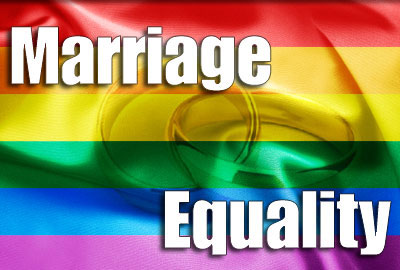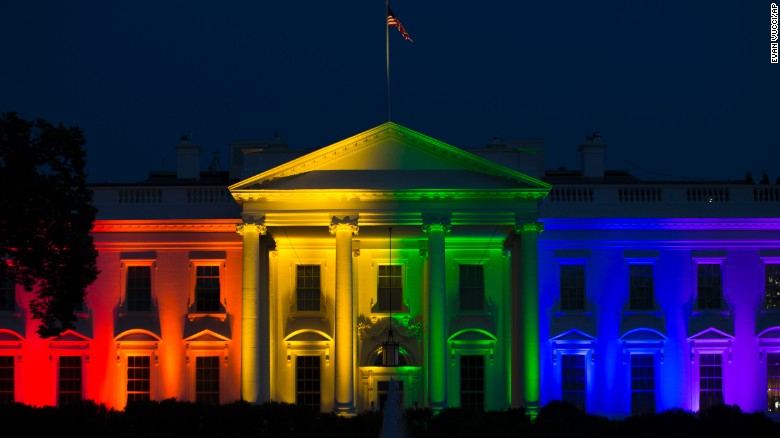
I have long been a supporter of equal rights and marriage equality. I am in a same sex marriage, so that should not surprise anyone. I was overjoyed when the Supreme Court of the United States (SCOTUS) decided on June 26, 2015 in a 5-4 vote in favor of marriage equality (see Obergefell v. Hodges). This decision found that State bans against same-sex marriage and the failure to recognize those marriages performed in a different State were unconstitutional under the Fourteenth Amendment of the Constitution of the United States (COTUS).

The White House was lit in rainbow colors to celebrate the decision
Not everyone has been happy with this decision. Here are some of the concerns and my response to them:
Concern: Churches will now be forced to marry same-sex couples.
Some churches do marry same-sex couples, but that is the decision of the church leaders, not of the U.S. government. Religious beliefs are protected by the first amendment of the COTUS and this decision does not change that. Churches can continue to decline marriage services to interracial couples, blacks, whites, same-sex couples or anybody else they choose to reject. For example, a church denied marriage to a black couple in Mississippi (link). Race has long been held as a protected class, but the church was within its rights to deny them.
Concern: The SCOTUS overstepped its bounds. This is a State issue.
SCOTUS has ruled at least 15 times, including the recent decision, in matters involving marriage and has affirmed repeatedly that marriage is a fundamental right (see here). Perhaps the most closely related case to the recent decision is the Loving v. Virginia case. This decision repealed anti-miscegenation laws allowing interracial couples to marry in 15 states that banned their marriages before the decision. This shows a clear precedent of the SCOTUS overturning State laws on marriage due to Fourteenth Amendment violations.
Concern: This sets the stage for legal polygamy.
While some of the arguments used in favor of marriage equality for same-sex couples can be used in favor of polygamy, there are some important exceptions. The Fourteenth Amendment used to justify the recent decision does not apply to polygamy. For the Fourteenth Amendment to apply, the State must allow some groups to be polygamists while not allowing other groups the same access to the law. There is no inequality where everyone is treated the same and only allowed one spouse.
You may say this applied to SSM as well as everyone could pick one spouse of the opposite sex. The problems with this thinking is that same-sex couples were denied a marriage partner with someone they were attracted to while heterosexual couples were not denied. Also, from a sexual standpoint, a woman could marry a man, so why couldn't a man marry a man? The arguments against SSM could not find a convincing reason that the State should be allowed to discriminate on this basis. On the other hand, nobody is born a polygamist and their choice in finding a marriage partner is not limited any more than any other person.
Concern: People will be able to marry animals, children, siblings or inanimate objects.
Civil marriage is a legal agreement. Most of these examples, namely animals, children and inanimate objects cannot consent to such an agreement. They simply cannot enter into any legal agreement, especially not one as important as marriage. Allowing same-sex couples to marry doesn't change this.
Allowing same-sex couples to marry doesn't change laws against incest and will not allow siblings or other members of the immediate family start marrying each other. There are compelling reasons for this restriction. One is the risk of undue influence. One member of the family may be able to exert power over another due to their existing close relationship resulting in the inability to consent to the marriage contract freely. Another is that marriage is meant to establish kinship between two individuals. This already exists with members of ones immediate family.
Concern: God defined marriage. Man can't change what God has defined.
The SCOTUS decision affected Civil Marriage, not religious marriage. If your religion believes that God defines marriage only between man and woman, then this decision doesn't change that. However, the laws of the United States of America are not based on religious dogma. The secular nature of the government means that laws cannot put the beliefs of those that think God has defined marriage one way over those that do not hold that view without a compelling, secular reason. There is no compelling, secular reason to restrict marriage to one man and one woman so the laws banning same sex people from marrying were overturned.
 Ramblings of the Web Master
Ramblings of the Web Master